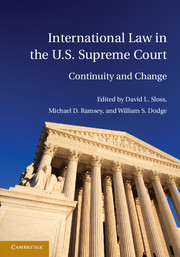Book contents
- Frontmatter
- Contents
- List of Contributors
- Table of Cases
- Acknowledgments
- Introduction
- PART I FROM THE FOUNDING TO THE CIVIL WAR
- PART II FROM THE CIVIL WAR TO THE TURN OF THE CENTURY
- PART III FROM THE TURN OF THE CENTURY TO WORLD WAR II
- PART IV FROM WORLD WAR II TO THE NEW MILLENNIUM
- PART V INTERNATIONAL LAW IN THE U.S. SUPREME COURT IN THE TWENTY-FIRST CENTURY
- V.A TREATIES AFTER 2000
- V.B CUSTOMARY INTERNATIONAL LAW AFTER 2000
- Main Essay – Sosa and the Derivation of Customary International Law
- Response Essay – “Cheap Talk” about Customary International Law
- Response Essay – History, Ideology, and Erie v. Tompkins
- V.C INTERNATIONAL LAW AND CONSTITUTIONAL INTERPRETATION AFTER 2000
- V.D INTERNATIONAL LAW AND STATUTORY INTERPRETATION AFTER 2000
- V.E INTERNATIONAL LAW AND THE WAR ON TERROR
- VI CONCLUSION
- Index
- References
Response Essay – History, Ideology, and Erie v. Tompkins
Published online by Cambridge University Press: 05 July 2011
- Frontmatter
- Contents
- List of Contributors
- Table of Cases
- Acknowledgments
- Introduction
- PART I FROM THE FOUNDING TO THE CIVIL WAR
- PART II FROM THE CIVIL WAR TO THE TURN OF THE CENTURY
- PART III FROM THE TURN OF THE CENTURY TO WORLD WAR II
- PART IV FROM WORLD WAR II TO THE NEW MILLENNIUM
- PART V INTERNATIONAL LAW IN THE U.S. SUPREME COURT IN THE TWENTY-FIRST CENTURY
- V.A TREATIES AFTER 2000
- V.B CUSTOMARY INTERNATIONAL LAW AFTER 2000
- Main Essay – Sosa and the Derivation of Customary International Law
- Response Essay – “Cheap Talk” about Customary International Law
- Response Essay – History, Ideology, and Erie v. Tompkins
- V.C INTERNATIONAL LAW AND CONSTITUTIONAL INTERPRETATION AFTER 2000
- V.D INTERNATIONAL LAW AND STATUTORY INTERPRETATION AFTER 2000
- V.E INTERNATIONAL LAW AND THE WAR ON TERROR
- VI CONCLUSION
- Index
- References
Summary
Professor McGinnis's lucid, balanced, and insightful essay is surely correct in suggesting that the long-term significance of the U.S. Supreme Court's decision in Sosa v. Alvarez-Machain is uncertain. The far-reaching impact of globalization, the changing position of the United States in world affairs, and the evolution of domestic social and cultural values may reshape attitudes toward the substantive political issues that underlie current debates over customary international law. His suggested analogy to Washington v. Glucksberg could prove apt. The Court's history, after all, is replete with doctrines, analytic frameworks, and interpretive methodologies that have been applied erratically, remolded drastically, discarded silently, or repudiated overtly.
Political Dynamics and Constitutional Arguments
As Professor McGinnis has explored Sosa's doctrinal implications so thoughtfully, I consider the case from a different perspective – as a paradigmatic example of the political dynamic and rhetorical practice of American constitutionalism. The key to understanding our governmental system is to recognize the ways in which partisan groups struggle to secure relatively hospitable institutional havens for themselves among the levels and branches of government. Such groups support the levels and branches they perceive as most likely to favor their policy goals and seek to check those they perceive as obstacles or threats. Constitutional doctrines, theories, and principles serve as tools to magnify the institutional power of the former while minimizing that of the latter.
- Type
- Chapter
- Information
- International Law in the U.S. Supreme Court , pp. 499 - 504Publisher: Cambridge University PressPrint publication year: 2011

